August Pauli
Die Gruender der Christengemeinschaft: Ein Schicksalsnetz
By Rudolf F. Gaedeke
Translated by Cindy Hindes
July 31, 1869, Hernsheim/Franconia – January 6, 1959, Munich
August Pauli, the second oldest of the founding circle, lived through a very similar destiny as did Friedrich Rittelmeyer and brother Heinrich Rittelmeyer, as well as Hermann Heisler and Christian Geyer. Pauli shared his French homeland with Friedrich Rittelmeyer and Christian Geyer and almost the same theological training and ministerial experience with all of them. Hermann Heisler, Heinrich Rittelmeyer, and August Pauli remained individual campaigners, while Christian Geyer and Friedrich Rittelmeyer were united by their unique friendship over many years.
August Pauli was born on July 31, 1869, the second of five children, in the vicarage at Hernsheim in Lower Franconia. The boy spent his first seven years in the natural, purely rural environment of the small village where his father worked as a priest.
His second seven years were marked by a move to Nördlingen and small-town life when his father became dean there. The boy went through elementary and Latin school (1876-1883) until, at the age of fourteen, he entered high school, the Anna-Kolleg in Augsburg, where he passed his Abitur in 1887. His preparation for confirmation and the celebration itself became a particularly profound experience for him in which he learned not only outwardly that the human being partakes in Christ’s grace. The experience opened up inwardly for him: This also means me; I am included in it.
From his entire school years, August Pauli only reported on his history teacher, Professor Metzger, in Augsburg, whose enthusiastic teaching captivated the schoolchildren.
Four semesters of theological studies in Erlangen passed as if without a trace on his soul, and nothing was reported about life in the student fraternity Uttenruthia. It was not until his third year of study in Tubingen that he was forced to follow the students’ example into a more intensive engagement with the study contents. The main occupation involved learning by rote, as it once was at school. The fourth year of study, again in Erlangen, was similar. One of his fellow students was the later famous Ernst Troeltsch; he was followed in the Uttenruthia by ‘the fox’ Friedrich Rittelmeyer, who immediately attracted attention because, as a newcomer, he wanted to give a speech.
Despite his lack of participation, August Pauli passed his first examination in 1891 so well that he was recommended to the Munich seminary. He immediately began his service as a vicar. At twenty-two, he suddenly found himself in the pulpit of his hometown of Nördlingen, substituting for his father, who was seriously ill and soon died. After the third sermon, Pauli thought he had said everything he knew. How was it to continue? The young pastor Dr. Christian Geyer, with whom he had become acquainted as a colleague, provided him with a certain amount of help that his father could no longer give him. From Nördlingen, he then passed the Second Theological Examination in Ansbach.
After three years of this first period of learning, the church leadership transferred him in 1894 as a traveling preacher to the diaspora parishes of Upper Bavaria in Tolz, Miesbach, Holzkirchen, and Tegernsee. In the Catholic area, his activity was quite varied, with constant travelling. The mine workers in Hausham near Miesbach, the immigrant Swabian farmers in Holzkirchen, the bathers in Bad Tolz, and the aristocrats in Tegernsee each formed their own kind of community. And the most diverse acquaintanceships and connections developed – also with “crowned heads.”
In 1897, August Pauli was now twenty-eight and not yet married, when something deeply shocking happened to him; while he himself was in love with a girl, he received a letter from a young man who told him that his sister was devoted to Pauli, and that she was sure he loved her too. This episode, which does not seem to be very significant, awakened a profound problem in August Pauli: Is it permissible for a Christian to experience happiness at the expense of others or alongside the suffering of others? Questions now arose that awakened his own judgements. This struggle gave rise to his first writing:On the Trail of Life – Diary of a Young Theologian. (Auf der Spur des Lebens. Tagebuch eines jungen Theologen.)
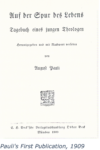 The reflections in Schultze Naumburg’s magazine Kunstwart gave rise to interest in and questions about art. Friedrich Naumann, the theologian who became a politician, awakened Pauli’s interest in politics. In theology, which had hitherto been the content of his studies, historical interest in Jesus awoke, and Christ as the Son of God disappeared from consciousness. “At that time, the path had to be taken from the dogmatic Christ, who no longer had any life in him for us, to the historical Jesus.” It was as if, at a later point in the unfolding of his life, something came to light that others had experienced earlier. August Pauli was a loner. He also took his inner steps basically in melancholy solitude and without a friend.
The reflections in Schultze Naumburg’s magazine Kunstwart gave rise to interest in and questions about art. Friedrich Naumann, the theologian who became a politician, awakened Pauli’s interest in politics. In theology, which had hitherto been the content of his studies, historical interest in Jesus awoke, and Christ as the Son of God disappeared from consciousness. “At that time, the path had to be taken from the dogmatic Christ, who no longer had any life in him for us, to the historical Jesus.” It was as if, at a later point in the unfolding of his life, something came to light that others had experienced earlier. August Pauli was a loner. He also took his inner steps basically in melancholy solitude and without a friend.
He was strengthened in this by his intensive reading of the writings of Søren Kierkegaard, who had particularly emphasized the importance of the striving single individual and had ultimately given a harsh critique of official church Christianity. August Pauli found in Kierkegaard a precise description of his own stage of development.
Tolzer’s term of office also saw Pauli’s first meeting with Dr. Johannes Müller, who had just moved to Schliersee. August Pauli met him in person. The emphasis on the individual, the single personality, was also the basic motif of Müller’s work, and August Pauli, who was increasingly questioning the fixed forms of the church and church service, found confirmation in the spontaneous, humane nature of Johannes Müller’s work.
At the turn of the century, in 1899, August Pauli became pastor of the small Lower Franconian parish of Westheim. A 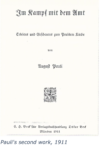 mere farming village, it was prosperous and knew how to maintain this prosperity with firm social forms, right up to marriage. The parish priest was an integral part, indeed the guarantor and often the enforcer of the customs and laws of old. The new pastor had questions everywhere, challenged the customs: Should this be Christianity? Is it not rather Old Testament, pre-Christian? Is a people’s church at all capable of being Christian? Doesn’t the uniformity of a community contradict spontaneous enthusiasm, the filling of the individual with the spirit? “O could I, like Paul, be a carpet weaver and then, when I wanted to, not if it drove me, if it were an inner necessity for me, help my fellow men come to the truth, to God – would that not be the better, I might say purer in style and therefore a more effective way to serve the cause of Jesus?” Thus wrote August Pauli in his book Im Kampf mit dem Amt. Erlebtes und Geschautes zum Problem Kirche [Struggling with the Office. Experiences and Observations with the Problem of the Church] (1911, p. 47), which was probably significantly influenced by his experiences in Westheim. He could “do nothing but faithfully guard their [the church’s] sleep.”
mere farming village, it was prosperous and knew how to maintain this prosperity with firm social forms, right up to marriage. The parish priest was an integral part, indeed the guarantor and often the enforcer of the customs and laws of old. The new pastor had questions everywhere, challenged the customs: Should this be Christianity? Is it not rather Old Testament, pre-Christian? Is a people’s church at all capable of being Christian? Doesn’t the uniformity of a community contradict spontaneous enthusiasm, the filling of the individual with the spirit? “O could I, like Paul, be a carpet weaver and then, when I wanted to, not if it drove me, if it were an inner necessity for me, help my fellow men come to the truth, to God – would that not be the better, I might say purer in style and therefore a more effective way to serve the cause of Jesus?” Thus wrote August Pauli in his book Im Kampf mit dem Amt. Erlebtes und Geschautes zum Problem Kirche [Struggling with the Office. Experiences and Observations with the Problem of the Church] (1911, p. 47), which was probably significantly influenced by his experiences in Westheim. He could “do nothing but faithfully guard their [the church’s] sleep.”
To vent his soul, he wrote polemical articles in the Pastors’ Correspondence Journal, which soon made him known throughout the country as a ‘highly questionable heretic.’ “By openly and courageously confronting the terrorism of an outdated orthodoxy for the first time, the movement was prepared, which my friends Dr. Geyer and Dr. Rittelmeyer later took into their own hands,” he later wrote.
In 1908, his decision had matured; August Pauli resigned from the service of the Bavarian Regional Church after seventeen years of work. He worked as a freelance speaker in southern Germany and in the summer months at Mainberg Castle, near Schweinfurt, as a private secretary to Johannes Müller. The latter gathered a congregation there near Elmau (1908-1911). During this time, Pauli met his wife, Elsbeth Seydler (October 13, 1881), who came from Königsberg in East Prussia. He also had an important, longer meeting with Christoph Blumhardt in Bad Boll/Württemberg, where he experienced the special, healing presence of the spirit in prayer, with which father and son Blumhardt had been able to work so convincingly.
What is special about August Pauli’s biography compared to that of Hermann Heisler is that he saw himself as able to re-enter the church ministry after a four-year break. In Bavaria, the church did not accept this’ heretic.’ Still in office in Munich was president Bezzel, with whom Friedrich Rittelmeyer had had harrowing experiences.
August Pauli became pastor on the ridge of the Thuringian Forest in Schmiedefeld near Wallendorf. He had also married there at the beginning of August 1914. Despite 4000 members, there was no ‘proper’ congregation among the poor farmers and workers in that harsh climate. People were more or less socialist; there was no religion. On Christmas Day, there was finally time to slaughter a pig; the church was empty – so empty that sometimes no sermon had to be preached. This changed abruptly with the outbreak of the First World War. The church was overflowing, and field services had to be held. Every man wanted to take communion once more – or for the first time – before enlisting: a field of work “calling for a heathen mission.”
From 1916 to 1918, August Pauli worked as a pastor in Weißenfels an der Saale, the place where Novalis died. There, too, his experiences with the Thuringian-Saxon population were not much different from those in Schmiedefeld. He had to administer a “pastoral parish with about 12,000 souls”. There were too many outer obligations, for example, funerals. “I was curious myself when I stepped up to a new grave, what I would say again.” “I had to tell myself that a church that makes its servants accept such things is itself contributing to the complete devaluation of its sacred acts.”
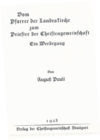 But the political orientation of the church was also intolerable to August Pauli. On the birthday of the emperor (January 27, 1918), the superintendent held the sermon with the theme: “The Hohenzollerns are given to us by God for wisdom and for justice and for sanctification and for salvation.” So his friend Christian Geyer’s offer to take up a pastorate in Nürnberg fell on good ground. But the church leadership did not want to see him in Nürnberg. So he went to Regensburg (December 1918). Even though the people in this southern German city were more accessible and open, church life again shaped itself in the old traditional forms. “I was obviously not yet in the right stream.” In 1921/22, the ‘Leimbach case’ occurred in the Bavarian Regional Church. Pastor Leimbach in Öttingen was a militant advocate of a radical-modern theology. Bavaria’s pastors were divided over him when he was to be suspended. Dr. Christian Geyer, at the head of about fifty modern-minded colleagues, took a six-month leave of absence. In view of the founding of The Christian Community, which Geyer helped to prepare, he hoped to be expelled from the church. This did not happen, and Geyer travelled back to Ansbach to the General Synod instead of Breitbrunn and Dornach.
But the political orientation of the church was also intolerable to August Pauli. On the birthday of the emperor (January 27, 1918), the superintendent held the sermon with the theme: “The Hohenzollerns are given to us by God for wisdom and for justice and for sanctification and for salvation.” So his friend Christian Geyer’s offer to take up a pastorate in Nürnberg fell on good ground. But the church leadership did not want to see him in Nürnberg. So he went to Regensburg (December 1918). Even though the people in this southern German city were more accessible and open, church life again shaped itself in the old traditional forms. “I was obviously not yet in the right stream.” In 1921/22, the ‘Leimbach case’ occurred in the Bavarian Regional Church. Pastor Leimbach in Öttingen was a militant advocate of a radical-modern theology. Bavaria’s pastors were divided over him when he was to be suspended. Dr. Christian Geyer, at the head of about fifty modern-minded colleagues, took a six-month leave of absence. In view of the founding of The Christian Community, which Geyer helped to prepare, he hoped to be expelled from the church. This did not happen, and Geyer travelled back to Ansbach to the General Synod instead of Breitbrunn and Dornach.
August Pauli had known about anthroposophy for over a decade through his wife but had not found a special relationship with it. He, too, took a six-month leave of absence because of the Leimbach case. Initially, he had not heard about the preparations for the founding of The Christian Community. Now that he had time, the news came just in time. It became clear to him what had to happen, and he intensively studied the transcripts of the first two so-called ‘theology cycles,’ which Rudolf Steiner had held in the summer and autumn of 1921.
It is pointless to speculate about how many of the fifty progressive pastors around Christian Geyer would have found their way to The Christian Community if he had gone before them. Certainly not very many. It took a deeply personal decision. But August Pauli made this decision. He resigned from the church service for the second time and worked among the founders from the Breitbrunn meeting onward. “Even in my most recent and highest relationships, I bind myself to those who, like me, want to be bearers of the mission of Christ, which we do not receive as individuals, but as a community.”
Rudolf Steiner had explained to him that, actually, only two realizations were necessary for cooperation: That in Jesus, there lived more than a human being and that there must be a new liturgy. Vom Pfarrer der Landeskirche zum Priester der Christengemeinschaft [From Pastor of the National Church to Priest of The Christian Community] is the title of the book August Pauli published in 1928, in which he described the path traced here.
He had walked it in his own way, thoughtfully and thoroughly. The insight that the preaching ministry, as well as the people’s church, urgently needed renewal had already come in 1908, but then fourteen years had passed before he wanted to help build a new church of the future.
As full of pressing questions and deeply moved as the first part of his life had been, he then served the new mission steadily and straightforwardly in the congregation of The Christian Community in Munich, which he founded. In Munich, he began the new work with Gerhard Klein immediately after the ordinations in 1922. In November 1923, Gerhard Klein left Munich, and Hermann Heisler joined Pauli. Seven years younger, he had often taken his steps in life very similarly. But in temperament and style, there had hardly been a greater contrast among the founders of The Christian Community.
Hermann Heisler was a fiery speaker, but August Pauli was always thoughtful and calm, even taciturn, or even aloof, as a friend called it, but always balancing and forming the calming pole in the spiritual discussions of a community that was repeatedly subjected to severe tests.
Probably the most severe of these – besides the ban – was the conflict that broke out in 1933 through Gertrud Spoerri. Hermann Heisler came out sharply against her. August Pauli tried intensively to bring about a mediation. Finally, Friedrich Rittelmeyer travelled from Stuttgart and announced her leave of absence.
The exhilarating time of the beginning of all congregational work for The Christian Community had thus come to an end. The rising power of the National Socialists overshadowed all free spiritual life. Hermann Heisler had to give way to this. He had violated a ban imposed by those in power, and it was necessary for August Pauli to agree to his departure, even though the two men, so different from each other, had become close friends.
Of August Pauli’s two children, his son Reinhold, born in 1915, died in 1938 during a mountain hike at the ‘Totenkirchl’ in the Wilden Kaiser, east of Kufstein. This experience had deeply shaken August Pauli, and Hermann Heisler had been a strong support for him during this most difficult time.
The death of his son unleashed new abilities and possibilities in August Pauli. At almost seventy years of age, he 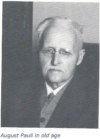 opened his soul to his fellow human beings in radiant mildness, and the refined humor of old-age wisdom met his friends. From that time on, August Pauli was able to perceive clear experiences from beyond the threshold, from the so-called dead, with an alert daytime consciousness. With this ability, he was able to help many people in the following difficult years of prohibition and war.
opened his soul to his fellow human beings in radiant mildness, and the refined humor of old-age wisdom met his friends. From that time on, August Pauli was able to perceive clear experiences from beyond the threshold, from the so-called dead, with an alert daytime consciousness. With this ability, he was able to help many people in the following difficult years of prohibition and war.
After the Second World War, August Pauli was the patriarch of the reconstruction phase of the congregation in Munich. He had to cope with the death of his wife Elsbeth in 1955 and another crisis among his colleagues. But then, the almost ninety-year-old was able to experience the consecration of the new church in Munich’s Leopoldstraße, revered and celebrated by the whole congregation. He was rightly one of the few wearers of the golden ring and the title of ‘Archpriest,’ a distinction that has only been awarded to a few priests to this day.
On Christmas Eve 1958, weakness forced him into bed. He died on January 6, 1959. Thus his dying was at the same time a journey through the twelve holy nights and a full awakening to the spiritual reality on Epiphany, the day of the appearance of the light from above.

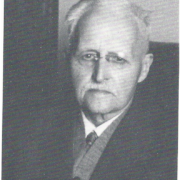

This is a very inspiring story to hear of one of the original Priests of the Christian Community, especially his experiences shepherding congregations during the time of war. I was especially touched by the empty churches being filled during WWI, interesting to say the least. Thanks for this!